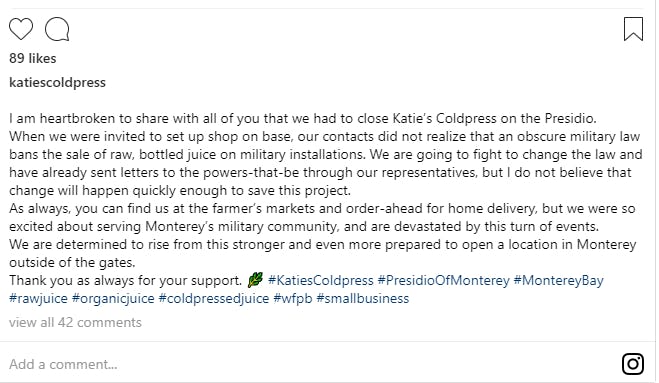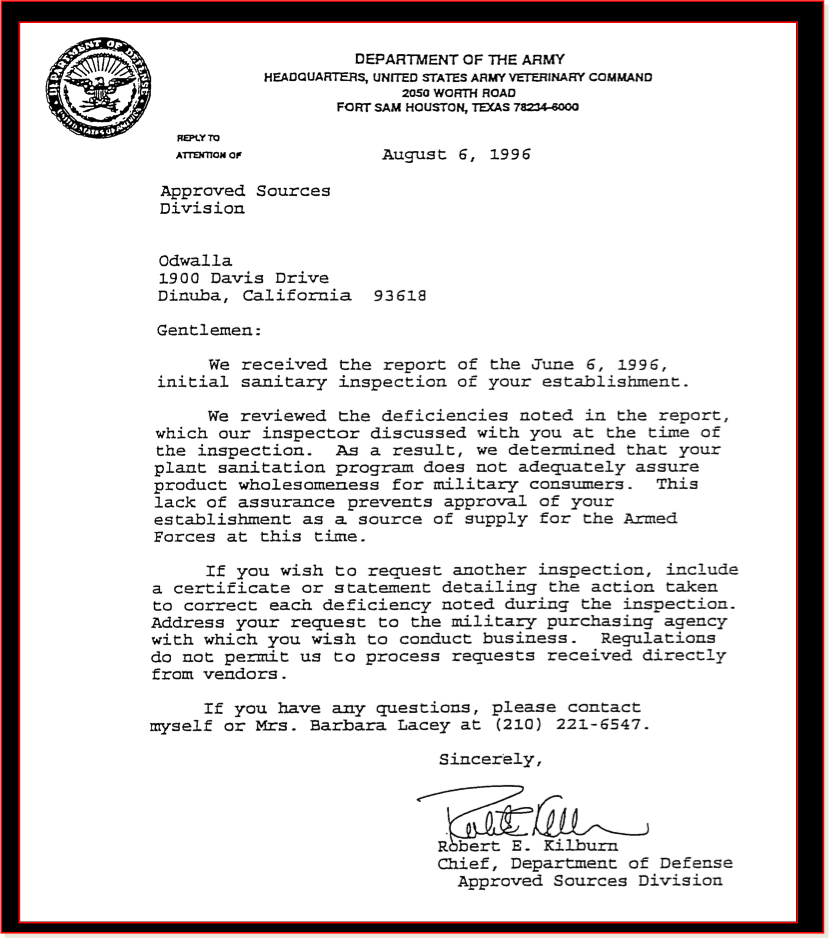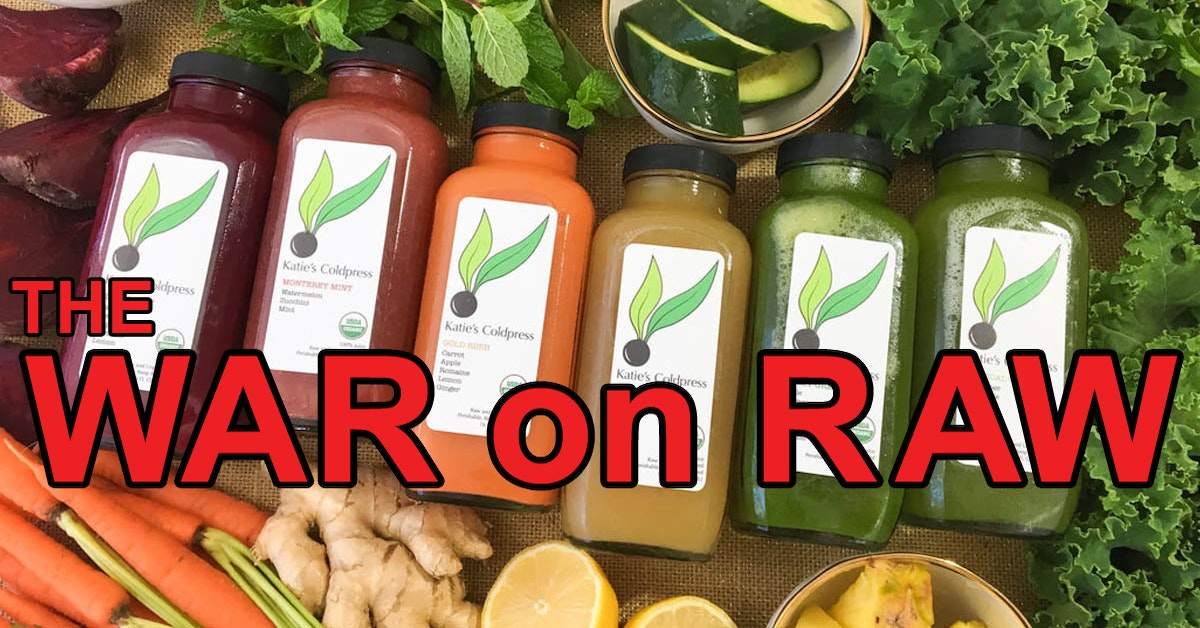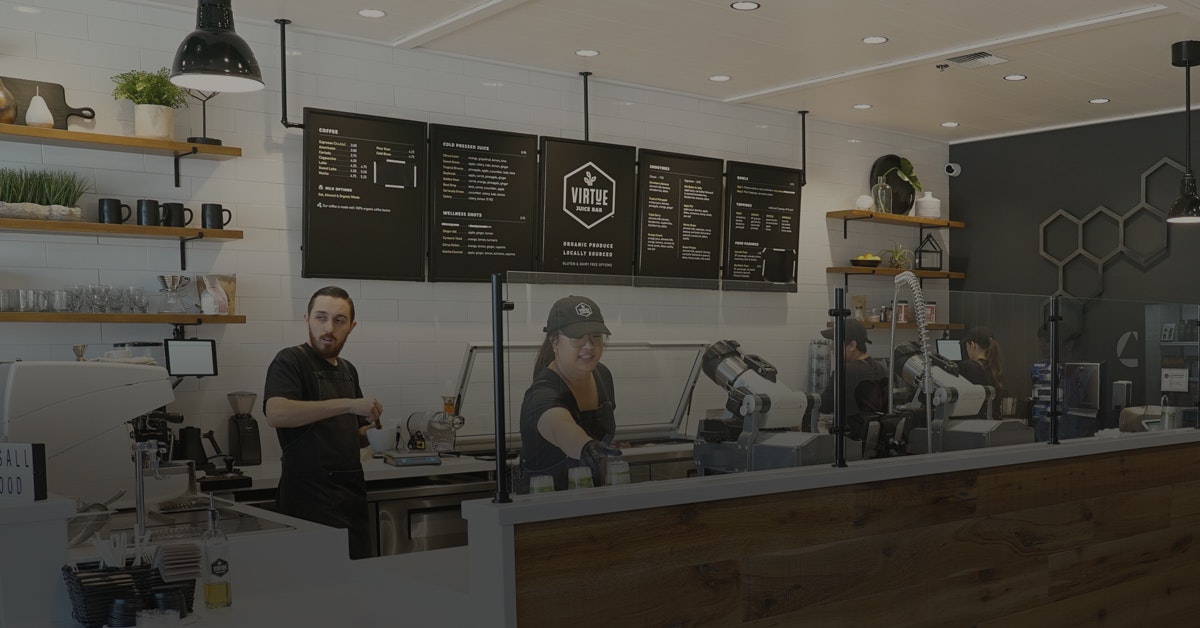It’s a warm day in Miami, the type where the sun feels good but not too hot, the perfect amount of ocean breeze. I’m laying on a reclining chair on the beach, head tilted back, enjoying the peaceful rumbling sound of the ocean in the distance. Like the Millennial I am I opened my phone to check Instagram…
I saw something that gave me a sinking feeling in my stomach. Our fellow juicepreneur Katie Raquel, owner of Katie’s Coldpress in Monterey, California, was forced by the government to shut down her new juice bar that she opened on her local Army base, the Presidio. It was just three months earlier at JuiceCon 2018 that Katie announced she would be opening that very same juice bar, with much support from the audience.

Not in my country…?
At first I thought there must be some mistake! Certainly our own US government wouldn’t make it illegal for our service men and women to nourish their bodies with the water from fruit and vegetables! But then reality set in—this is America where we have the juxtaposition of being the largest consumers of raw juice in the world, yet also have the strictest regulations, banning it for wholesale distribution. And apparently, any distribution at all on a Navy base according to their Tri-Service Food Code.
Here is the language regarding juice in the food code:
3-202.110 Juice, treated* Commercially processed Pre-PACKAGED JUICE shall–
(A) Be obtained from a processor with a HACCP system as specified in 21 CFR Part 120 – HACCP Systems; N and
(B) Be obtained pasteurized or otherwise treated to attain a 5-log reduction of the most resistant microorganism of public health significance as specified in 21 CFR Part 120.24 – Process Controls.
So, there you have it. If you plan on bringing bottles of juice onto a military base, even if it’s sold direct to the consumer, it must be pasteurized or HPP’d. This was a surprise even to the inspectors that approved the space, and to the excited troops and Commander who hosted a ribbon cutting ceremony for Katie. Word came down from the higher-ups that Katie must CEASE and DESIST immediately selling juice to the troops, for their own safety (oh, please).
Terrible? Yes. But surprising? Not really. The government has generally taken a strong stance against the distribution of raw juice in the US since 1996, immediately following the Odwalla E. coli outbreak.

1996 Odwalla E. Coli Outbreak
In 1996, a cluster of E. coli O157:H7 infections in the US (California, 26 cases; Colorado, 5 cases; Washington, 29 cases) and British Columbia, Canada (10 cases), were linked to the consumption of Odwalla juice containing raw apple juice as an ingredient. Twenty-five were hospitalized (mostly children) with at least five of them developing hemolytic uremic syndrome (HUS), a condition that affects the blood and blood vessels and can lead to kidney failure. This was a serious outbreak that made international news.
The FDA reacted, and within a few months put a new law into place that prevents juice brands from wholesaling raw juice. In the US, juice must now be processed to achieve a 5-log reduction in microbial count in order to sell wholesale. This means that juice must be either heat pasteurized or high pressure processed (HPP) or it can’t be sold wholesale (the full juice HACCP guidelines can be found here).
Although the outbreak was very serious and a very unfortunate event, I believe the ban on raw juice is over-regulation. Here’s why:
- Outbreaks are an unavoidable part of distributed food. In 2018 alone there were three major outbreaks of E. Coli in Romaine lettuce and ground beef, with 290 cases reported by the Center for Disease Control. If the government were to outlaw food every time there was an outbreak, we would have nothing left to eat.
- E. Coli existing in juice is a result of contamination, not a function of raw juice itself. Contamination is caused by using bad fruit that is already infected with E. Coli, usually as a result of fruit falling into animal feces and not being washed well, or using other unsafe food production practices. This was the case with Odwalla, as alleged by lawsuits brought against Odwalla.
Bill Marler, an attorney that represented some plaintiffs that sued Odwalla over the outbreak, posted some interesting documents on his blog. The below document shows that Odwalla failed a sanitation inspection by the Military, long before there were any laws against raw juice.

According to accounts cited by the New York Times, “the fast-growing company had significant flaws in its safety practices.” In fact, on the very morning of the outbreak “production managers brushed aside warnings from a young company inspector that a batch of apples was too rotten to use.”
I’m not trying to paint Odwalla in a bad light—this outbreak happened more than twenty years ago and nothing like this would happen today. My point is that if a juice maker uses rotten apples contaminated with E. Coli, of course the juice will indeed contain E. Coli, just as if you were to make a salad with lettuce contaminated with E. Coli, that salad will contain E. Coli.
I’m sure most people would agree that it would not be reasonable for the FDA to outlaw raw salad, so why have we accepted their regulation on raw juice? Shouldn’t we, as consumers, make that choice for ourselves?
The current laws are prohibiting the thousands of small juice companies in America from thriving, while at the same time enabling big beverage companies to own the wholesale market. Small juiceries should be able to wholesale locally, as long as they aren’t shipping juice further than can be safely managed. Local coffee shops could carry juice made by their neighbor today, instead of by Coca-cola three weeks ago.
What I propose would be a reasonably safe way to regulate the distribution of raw juice:
- The production facility / juice bar producing the juice must be HACCP compliant and regularly inspected, with special attention to receiving and cleaning produce.
- Juice may only be sold wholesale within a 30 mile radius of the production facility. This strict radius would allow the safe distribution and inventory management of raw juice, without worry that the juice is falling out of safe temperature during delivery.
- Juice must be marked with a maximum of 5 day expiration.
- Juice must be clearly labeled as raw, including the current raw warning labeling required by FDA. This allows the consumer to make the choice between raw or processed juice, at their discretion.
If we can come up with a more comprehensive guidance, we can work together and lobby the government for change. Last year at JuiceCon my brother Eric and I presented the formation of the Juice Makers Association, and at the next JuiceCon we will be opening the association up for membership. I believe the issue discussed above, plus working together on educating the public about juice will be the primary focus of the association, but this will ultimately be decided by the members of the JMA.
Please be part of the discussion.
Comment below, or come over to our Goodnature Juicing Facebook Group to join the discussion!
Comments
On a related note, what are your thoughts, or knowledge of, freezing juice -- still sold direct to the customer, not wholesale. Raw Generation, for example, ships raw unpasteurized, not HPP'd juice frozen and they say frozen juice will keep up to 6 months in the freezer... I assume this satisfies the FDA? And then in this case, my cold pressed juice company, Plant Monsters, would be eager to try this out with our X1 Mini and report back 😄
I think this depends on the state / health department. Some will allow it and some won't. Not 100% sure though!
Our hearts break for Katie. Her shut-down is unconstitutional! Hang in there, Katie - you'll rise up. We're sending all the good vibes from Kansas City. Thanks for your work Charlie and team. Looking forward to being part of this important conversation.
Hi Charlie,
I'm actually from Nigeria. I came in contact with your company at the IFT17. Your articles have been very amazing & educative!
I plan to open a juice shop in my country, but don't really have the proper training on ground.
Please how can you be of help?
Thank you.
Dorothy
Happy to answer any questions you might have about the business!
Hi, Charlie,
Great article, excited for the Trade Association to gain momentum ... So sad to hear about Katie having to close down her juice bar...goodness knows, our Military need raw juice !!! But her attitude is awesome and we know she is going to do great things for her community in other ways with her juice. Keeping her in our thoughts on that...
Hoping the government stays out of the rest of our juicebars...
Karen and Jake
True Juice
Karen and Jake, thank you so much for the kind words.
It’s time for a revolution!!
A juice revolution !!! 😄
I totally agree with everything in this blog and I really believe the law should change. In the meantime, we used to use the same loophole as sushi makers to distribute our raw juice. If you rent cooler space from the different places you want to distribute your juice and maintain your own temperature and also stock the shelves and pull inventory yourself you should be 100% within the law.
Thanks Laura good tip!
I’d love to hear more on this sushi loophole!
Hello y’all, this is a great discussion and a movement I want to be apart of. Local organic raw juice wholesale is in my future business plan regardless of current regulations. I guess I just have a feeling that these regulations are subject to change, and it’s only a matter of time that they do that. So what better way to help that along then to join the JMA.
There is a war From the FDA and Pharmaceutical Corps with all natural foods and natural remedies.
It's all very backwards to me. Considering the top ten ways to die are food and fitness related.
Yes pharma spends more money lobbying the government than any other industry. They "guide" health policy discussions.
This is also because pharma makes more money off of selling people medicine. They would lose tons if people new how valuable juicing truly is.
Just piggy backing on David from Fresh Juice Partners, distance may not be the best metric as there is technology that can track temperature (Ie food loggers). What I suggest is that for now wholeselling be limited to the same district that your health department regulatory system controls. For example I am in Las Vegas, regulated by there Southern Nevada Health District. I could sell to all cities with the SNHD control as the regulations would be uniform.
I like it!
Hello everyone!
Am I correct in understanding that no juice may now be sold (or even provided publicly through donation or freewill offering) anywhere in the United States without first enduring heat pasteurization or high pressure processing (HPP)?
Do either of these processes compromise (OR even possibly legitimately sustain) the nutritional integrity of juice? Once processed, is the juice no longer legally classified as "raw"? (Please excuse any obvious ignorance on my behalf.)
Thank you!
Juice may be sold by the juice maker direct to the customer, but not wholesale to retail shops, cafes, etc.
It is generally believed that raw juice contains more enzymes and nutritional value than pasteurized or HPP juice.
Some companies were labeling HPP juice as raw but faced class action litigation so they stopped calling their juice raw. There are still many smaller companies labeling HPP juice as raw. In my opinion, juice that's been processed with HPP should not be considered raw.
You can read more about HPP in my article The Truth About HPP.
Hello good afternoon, very interesting article and in my country something similar happens. There are many rules that we have to comply with and it is difficult to obtain the permits to distribute, at the moment we do not have an HPP base to treat the juices. Is there any kind of membership for ventures outside the USA?
ty
Thanks for the comment, yes the JMA will offer a special membership for international juice makers.
This blog is everything! As a small juicery in Sacramento, CA, we are the only one left in town that has stayed raw. All of the other local juice companies have begun to use HPP so that they can distribute. We were the first to open in town that was certified organic (we still are certified) and we have chosen to stand strong in staying raw. It has definitely pigeon-holed us that we can't distribute/wholesale, as we are continually receiving requests to bring our juice to local gyms and coffee shops and we also have to say no, sadly. We even have a local coffee shop, which is a sister company of ours and we can't even sell our juice there. With our regular health inspections and annual organic re-certification, our cleanliness and sanitization processes are always inspected and are also always praised. It's sad that the government doesn't realize that eating a raw carrot is no different than drinking a raw juice (as you mentioned in your raw salad analogy), not to mention all of the nutrients and goodness people receive from raw juice. I say we start a petition about this so places like us and Katie's cold-pressed juice bar can continue operating and have a fighting chance in an already challenging industry.
Thank you for this blog, it says all of the things I've been thinking!
Thank you for sharing, it means a lot. I'll make sure to stop by next time I'm in Sac and we can chat.
This article is amazing. How can we get involved?
Thank you!
JuiceCon 2019 will be the official launch of JMA. The dates of the event are Nov 9-10 in Miami (we are sending out the announcement this week). The best way to be involved is to be at JuiceCon, but if you can't make it just keep an eye out for JMA announcements. We will be launching the website later this year.
Indeed regulatory review is needed at this time. IMHO, there is no particular correlation between safety and a 30 mile circumference in regard to cold-chain integrity. That said, in 2019 temperature sensors are capable of proving integrity of time/temperature in a reasonable manner.
David Harrison
Fresh Juice Partners, LLC
P.S. Fresh Juice Partners is interested in the acquisition of existing juice bars, companies, etc.



Comment